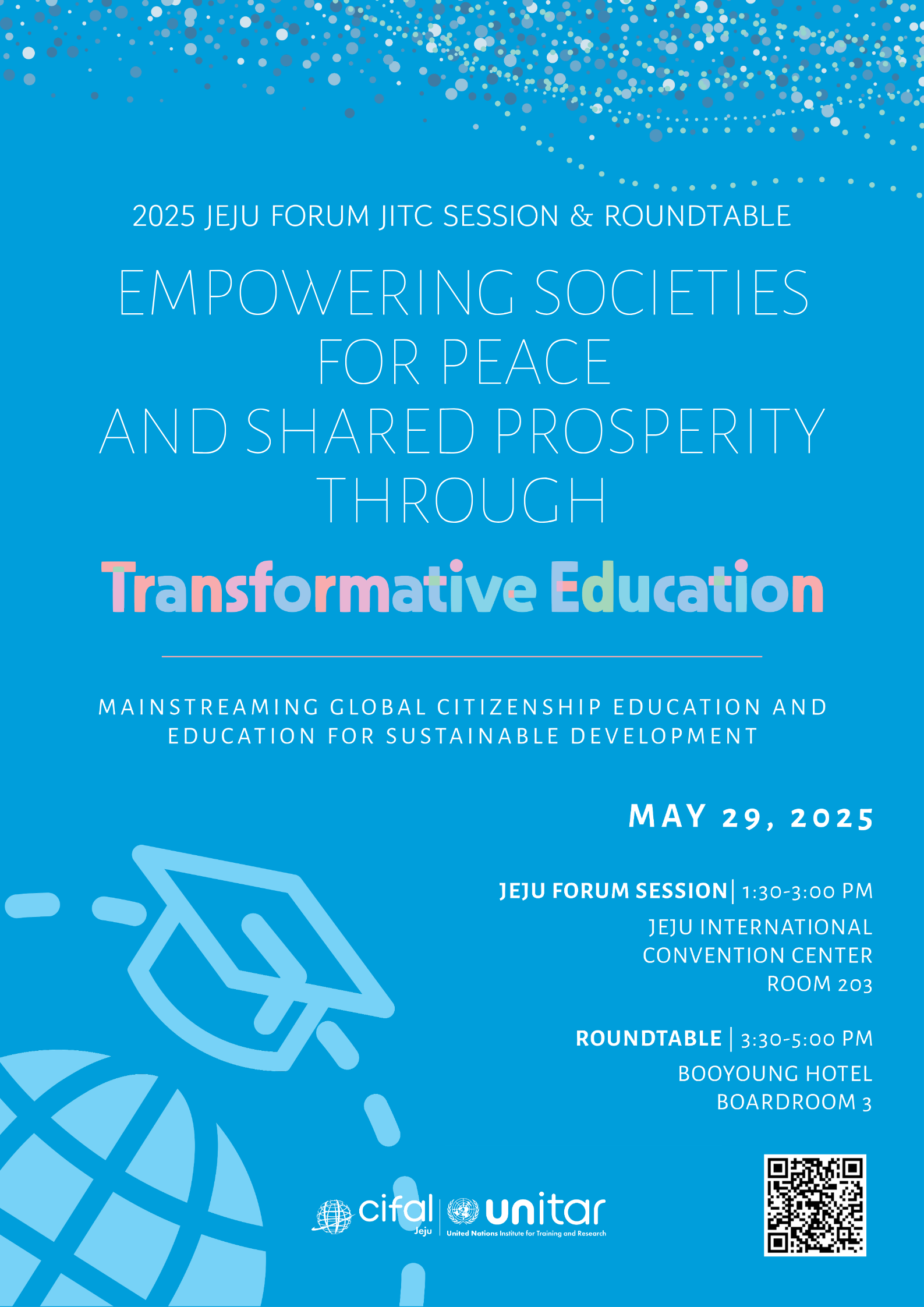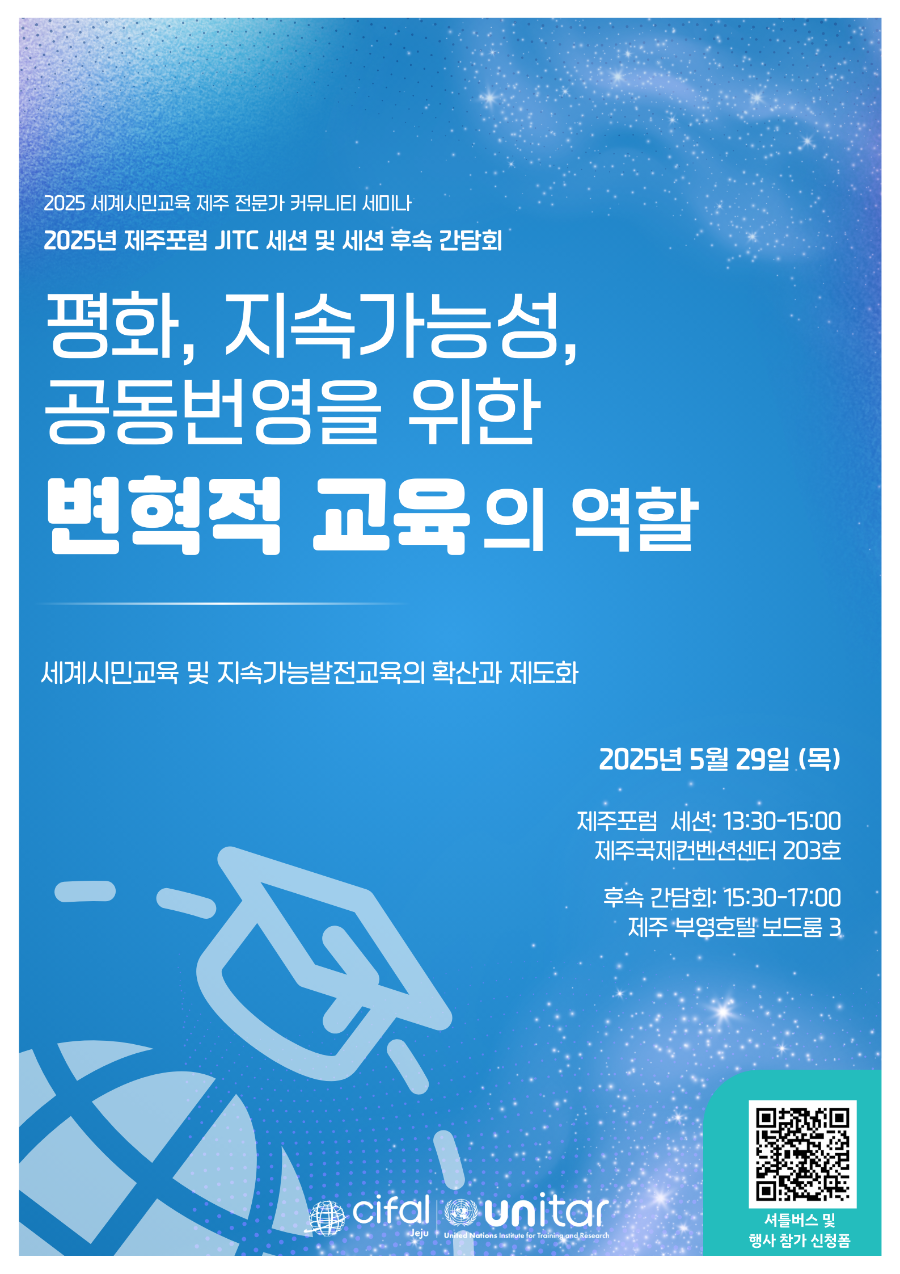
 2025.05.14
2025.05.14
|
Empowering Societies for Peaceand Shared Prosperity
through TransformativeEducation:
Mainstreaming Global CitizenshipEducation and Education for Sustainable Development
29May2025
Background
As challenges threateninguniversal human values intensify—including climate change, poverty andinequality, armed conflicts, and ethical issues arising from AIadvancement—there is a growing urgency for societal innovation promoting peaceand shared prosperity. Consequently, educational institutions increasinglyrecognize the need for specialized training to equip future generations withthe competencies to address these global challenges.
Target 4.7 of the UnitedNations Sustainable Development Goals (SDGs) mandates that by 2030, alllearners acquire the knowledge and skills needed to promote sustainabledevelopment, including, among others, through education for sustainabledevelopment and sustainable lifestyles, human rights, gender equality,promotion of a culture of peace and non-violence, global citizenship andappreciation of cultural diversity and of culture’s contribution to sustainabledevelopment.
The "Recommendation onEducation for Peace, Human Rights, International Understanding, Cooperation,Fundamental Freedoms, Global Citizenship and Sustainable Development"adopted at the 42nd UNESCO General Conference in 2023 emphasizes the transformativerole of education in fostering sustainable peace and human development.Fundamental principle 8.(n) specifically calls for cultivating “an ethic ofglobal citizenship and shared responsibility for peace, human rights, andsustainable development for the benefit of all, within planetary boundaries”with implementation recommendations spanning various action domains.
To fulfill this role,countries including the EU member states, Canada,the United Kingdom, and the Philippines are incorporating or mainstreamingGlobal Citizenship Education and Education for Sustainable Development intotheir formal curricula. Similarly, the Republic of Korea's 2022 revised curriculum, to be implementedin 2025, introduced interdisciplinary elective subjects for high schoolstudents including "Global Citizenship and Geography," "ClimateChange and Sustainable World," and "Climate Change and EnvironmentalEcology" within social studies and science disciplines.
However, the SustainableDevelopment Goals Report 2024 published by the United Nations expresses concernthat while 90% of countries report efforts to mainstream transformativeeducation, implementation remains insufficient in educational practice. Citing a 2023study, the report notes that 69% of 530 examined ninth-grade science and socialscience curricula make no mention of climate change, and 66% fail to includesustainability concepts, indicating gaps in practical mainstreaming. The reportemphasizes that effective transmission of sustainability principles to futuregenerations through educators requires comprehensive support from governments,schools, training institutions, and communities.
In this context,recognizing educational settings as active instruments for practicingsustainability-based peace and shared prosperity, we propose convening expertsin Global Citizenship Education and Education for Sustainable Development atthe international Jeju Forum to collectively explore directional frameworks andimplementation strategies for transformative education that will prepare futuregenerations to lead a sustainable world.
Overview
Event Objectives
This Workshop will: ● Disseminate thesignificance of mainstreaming transformative education —inter alia, globalcitizenship education and education for sustainable development—across bothformal and informal education systems, domestically and internationally, tofoster responsible global citizenship and local engagement among futuregenerations ● Providing a platformfor professionals and experts in future-generation education to discuss the transformativerole of education and explore the adoption of alternative forms of educationfor a sustainable future.
Inquiries
United Nations Institute forTraining and Research (UNITAR)
Centre International deFormation des Autorités et Leaders (CIFAL)
UNITAR CIFAL Jeju
Ms. Hyunju Grace Lee
Program Officer
Tel: +82-64-735-6581
Email: hjlee.jitc@cifaljeju.org
1. Program for Jeju Forum session
*The aboveprogram is subject to change.
A follow-up Tea Roundtable will be held in Boardroom 3 of the Booyoung Hotel after the Jeju Forum Session. All interested participants are warmly invited to join the roundtable. 제주포럼 세션 후 후속 간담회가 부영호텔 보드룸3에서 진행되니, 관심있으신 분들의 참여 부탁드립니다.
Registration deadline 등록 기간
Please register by Tuesday May 27, 2025 through the following link
5월 27일 화요일까지 아래 링크 또는 QR 코드를 통해 등록해 주시기 바랍니다.
|
||||||||||||||||||||||









